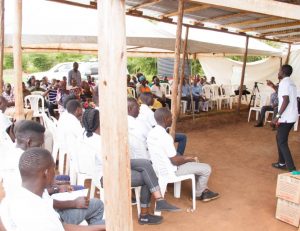The Ministry of Water and Environment of the Republic of Uganda in partnership with the GGGI Uganda office convened a workshop to review and align the National Environment Management Policy 2019 (NEMP) to the National Environment Act 2019 on February 26-27, 2020 at the Silver Springs Hotel Bugolobi, Kampala. The workshop was presided over by the new Minister of State Environment, Hon Betty Beatrice Anywar and was chaired by the Ag. Director Directorate of Environment Affairs, Mr. Collins Oloya.
A total of 20 participants took part with representation drawn from the following institutions; Ministry of Lands, Housing and Urban Development; 1st Parliamentary Council, Ministry Justice, and Constitutional Affairs; Environment Alert; National Environment Management Authority; Makerere University; Ministry of Local Government; Cabinet Secretariat and the Ministry of Water and Environment.
Hon. Minister during her remarks said that stakeholders need to put more emphasis on the laws since Uganda boasts of the best policies and laws. There is a need to acknowledge the damage done in the environment and to address them thus the technical people need to come out even more strongly if any amends are to be made. Mr. Collins Oloya informed the stakeholders that despite the challenges facing the sector, several strides had been made. He said these challenges directly underpin national economic growth and livelihoods security.
In 1994 the National Environment Management Policy (NEMP) established the government’s first strategies for integrating environmental concerns into the national development planning process and established the National Environment Management Authority (NEMA) to regulate this process. After twenty years and significant changes in legislation including the promulgation of the Constitution, it was time to review and update the policy to respond to new challenges and opportunities to improve environmental management.
We hope that the review and alignment will present the gaps and emerging issues, and produce a revised policy able to address environmental management in today’s setting and will trigger new legislation in particular to address environmental concerns relating to wetland management, biosafety and biotechnology, invasive species control, chemicals management, electronic and other hazardous and toxic waste management, oil and gas sector and mining industries, climate change and air quality amongst others.
The Ministry of Water and Environment pledged to continue with strengthening the sectoral coordination mechanism, to ensure effective compliance by all entities and stakeholders who interact with the Environment and its resources.


Issues for alignment in the NEMP
– RIA recommendations were strong on coordination to harness synergies, which is not strong in the policy- it should not be looked at as an operation issue, especially between government and non-state actors. Even if it appears to be an operation issue, it requires strategic guidance such as lack of a formal mechanism for coordination in the policy and Inadequate financing should also be reflected in the policy (financing mechanisms) e.g. EIA, vehicle levis, of which70% should go to environment management
– No formal structures for coordination of actors on air and water and Non-point water source pollution- no approaches to address it.
– Lack of institutional mechanisms to address alien species.
– Gaps on how to prevent the conversion of forest and wetlands on private land
– Coordination on issues outside the Ministry of Water and Environment e.g. the medical waste,
– Deforestation and wetland degradation-lands and local governments- issuance of titles in protected area statements are missing
– Reference to the Uganda Green Growth Development Strategy
– There is a need to have a section on a financing mechanism on green financing and developing supporting documents.
– Need to provide more incentives for the private sector (PPP) to invest in the green economy- e.g. SPGS
– Current policies need to be expanded to include conservation areas to improve the land tenure system.
– Deforestation is more on private land- need to make the forest and wetlands on private land an issue in the policy, catering for green spaces in the city, oil palm growing converts forests on private land
– We need to come up with a policy that addresses the management of forests on private land. Need to come up with strategies to address issues of deforestation
– Need to address wetland degradation- issues of rights, access and use of wetlands- need to mention natural resources under land tenure- need to have incentives for management of wetlands on private owners
– Land-use planning: The policy should provide for a proportion of green space in urban areas – need for a strategy in line with the physical planning act depending on whether it is a city, a municipality, etc.
– Conservation of Biological Diversity: Need to have a provision, which promotes equity and equitable access to sharing biological resources
– Environmental Accounting should be changed in the policy to Natural Capital Accounting and enhance the content to include sustainable development. Modify the heading in the NEMP to capture the mitigation hierarchy mechanisms instead of biodiversity offsets
– Environment and Macro-Economic Policy: The contribution to the different sectors is not reflected in the policy- need to include the sectors to which ENR contributes like National Oil Spill Contingency Preparedness and Response
– Payment for Ecosystem Services (PES): The key issue has been lack of environmental consciousness, we have not put place physical incentives to promote PES. No local or national buyers are involved. Need to take fully the tools of PES
– Strategic Environmental Assessment (SEA): Need to explain why the SEA was not being used including the fact that it was not in the law in the preamble. Include preparation of guidelines for SEA in the policy
– Environment Assessment and Monitoring: Need to have Environmental Assessment without monitoring in the heading. Need to include the limited professionalism, enforcement challenges in the preamble. Strategies: improve coordination among the stakeholders in ESIA
– Control of Pollution: Need for the policy to mention the different sources of air pollution (air and water pollution). Include non-point water pollution
– Water Resources Management: It is important to include drivers of deforestation in the preamble. Include more incentive for tree planting on private land. We need to include a strategy that promotes tree planting. Need to include a strategy on charcoal- Refer to the REDD+
– Agriculture and Farming Systems: Agriculture landscapes should maintain ecological landscapes to support agriculture. Include a strategy on socio-ecological resilience